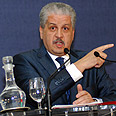
Algerian PM Sellal at press confrence
צילום: AFP
Algeria PM: Canadian orchestrated siege
Abdelmalek Sellal says Canadian gunman coordinated four-day siege of Algeria gas plant that claimed lives of dozens
Likely Canadian involvement in the deadly hostage taking at an Algerian gas plant that ended this weekend adds to Canadian government concerns about militant citizens who have trained with radical groups abroad or who seek to use violence to further their causes.
Algerian Prime Minister Abdelmalek Sellal said on Monday that a Canadian gunman had coordinated the four-day siege, which ended with Algerian forces storming the BP plant on Saturday. At least 80 people were killed, including 37 foreigners.
Related Stories
- Algerian assault ends crisis
- Experts: Algeria hostage rescue was rushed
- Algeria: Al-Qaeda planned attack on US ships
Canada condemned the attack and said it was seeking more details from the authorities in Algeria. At a news conference on Monday, Sellal gave the alleged Canadian militant's name only as Chedad. With some bodies burned beyond recognition and Algerian forces still combing the sprawling site, many details of the siege were still unclear.

Sellal defends decision to storm gas plant (Photo: EPA)
Canada, one of the few western nations actively seeking immigrants, has a large number of ethnic communities.
While the number of Canadians known to have been involved in radical actions appears small, they include Ahmed Said Khadr – a close associate of Osama Bin Laden – who died in a clash with Pakistani forces, and his son Omar, who pleaded guilty to killing a US soldier in Afghanistan and conspiring with al-Qaeda.
Omar Khadr, aged 15 at the time of the shooting, was transferred to a Canadian jail last September after spending almost 10 years in the US-run Guantanamo prison.
Canadian radicalization
"We are seeing a consistent volume of individuals being radicalized who are looking to travel abroad to either participate in, train for, or conduct terrorist acts," senior Canadian police office James Malizia said late last year in testimony to a House of Commons committee.
"The number of people traveling abroad is still very real and a very serious concern for us, as is the number of people who could potentially fall off the radar once they've left," said Malizia, an assistant commissioner with the national security branch of the Royal Canadian Mounted Police.
Canada's government introduced draft legislation last February making it illegal for Canadians to travel abroad to commit acts of terrorism. Canada, however, has no exit controls and cannot tell when someone leaves the country, a particular challenge to the authorities.
Malizia gave no details on who this legislation might target.
But in April 2012, the head of Canada's spy agency said as many as 60 Canadians had traveled – or tried to travel – to Somalia, Afghanistan, Pakistan and Yemen to join al Qaeda-affiliated groups and engage in terror-related activities.
Jez Littlewood, director of the Canadian Centre of Intelligence and Security Studies at Ottawa's Carleton University, said Canada was not a particular hotbed for sending people abroad to cause trouble, despite its multicultural nature.
"The radicalization of the communities in Canada in relative terms has been lower that one might have expected," he told Reuters, citing the number of British and American nationals arrested on suspicion of planning or taking part in attacks.
- Receive Ynetnews updates directly to your desktop










